2019届高考英语艺考生文化课冲刺总复习课件——语法讲解篇—语态 (共25张PPT)
文档属性
| 名称 | 2019届高考英语艺考生文化课冲刺总复习课件——语法讲解篇—语态 (共25张PPT) | 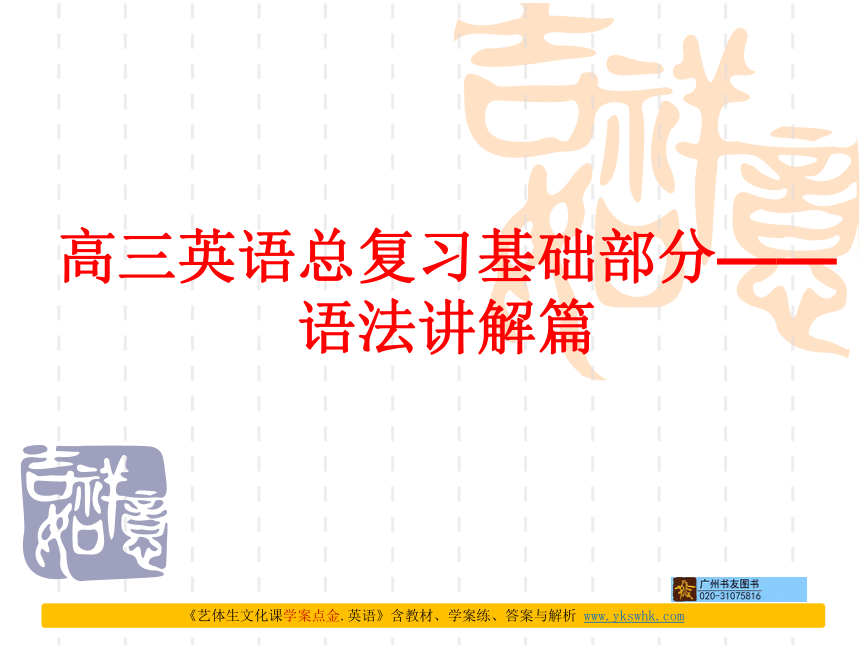 | |
| 格式 | zip | ||
| 文件大小 | 2.5MB | ||
| 资源类型 | 教案 | ||
| 版本资源 | 通用版 | ||
| 科目 | 英语 | ||
| 更新时间 | 2019-03-16 22:51:50 | ||
图片预览

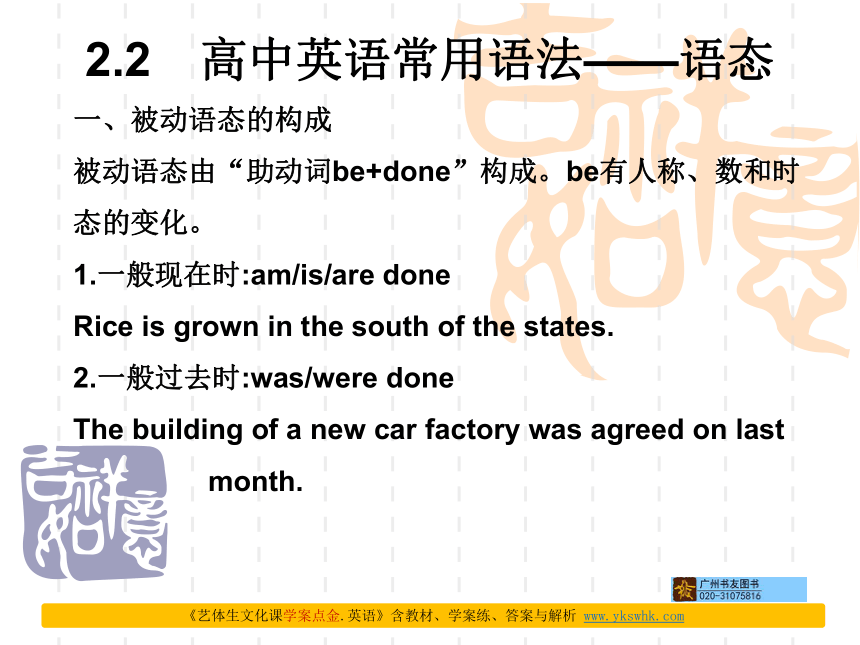
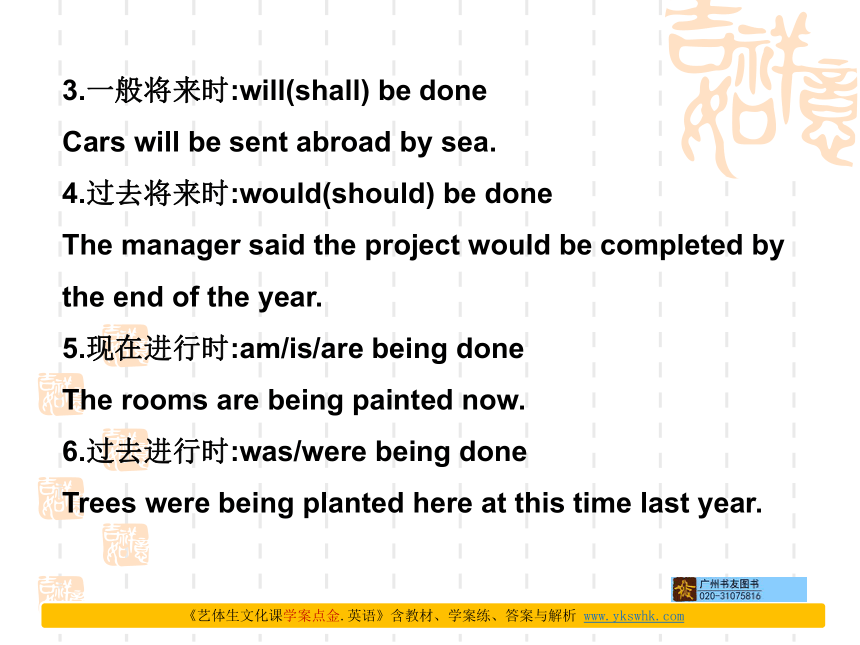
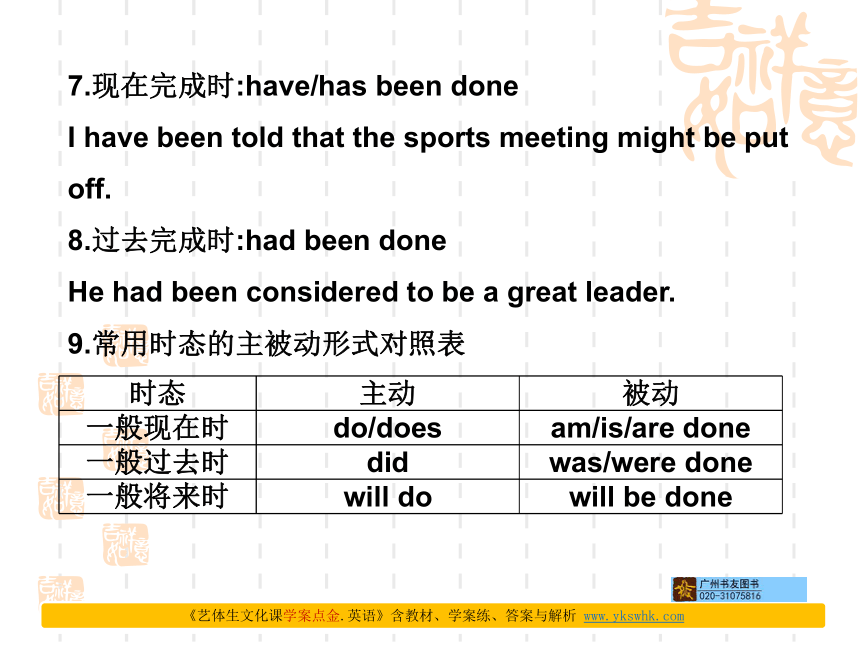
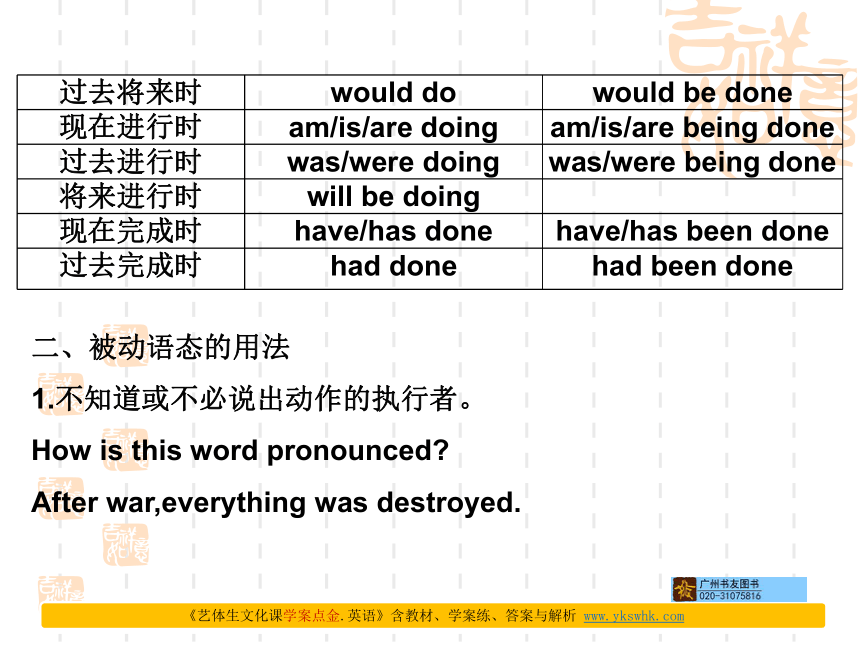
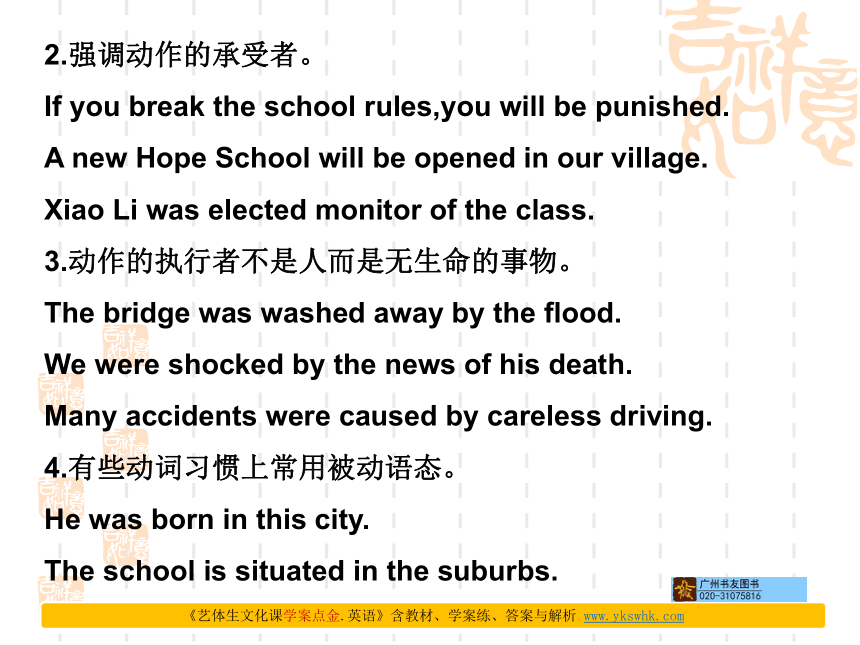
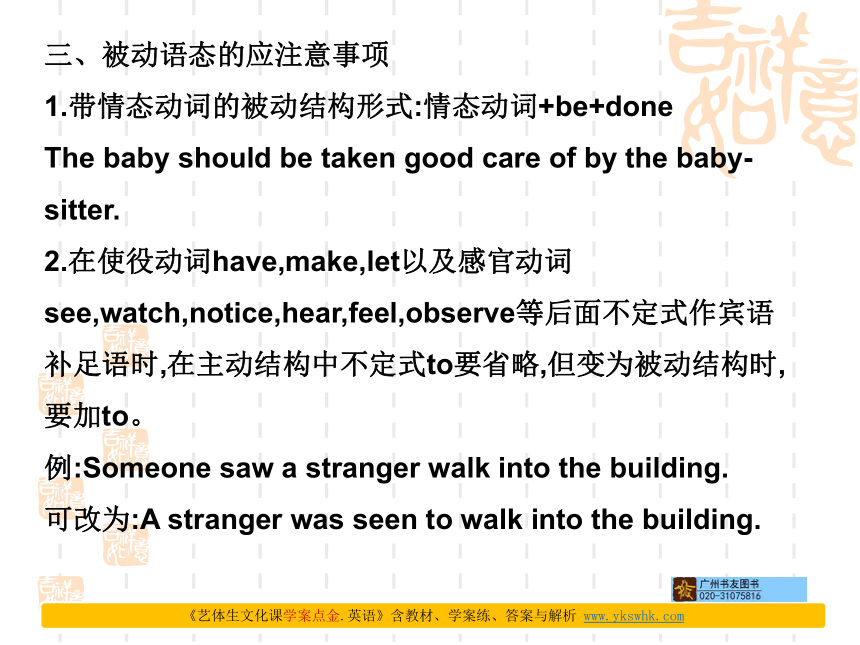
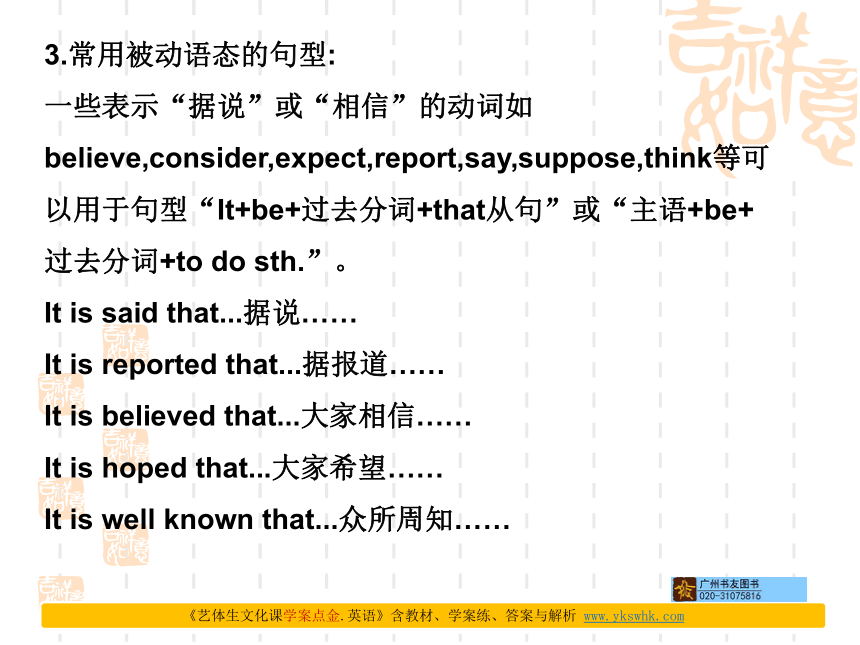
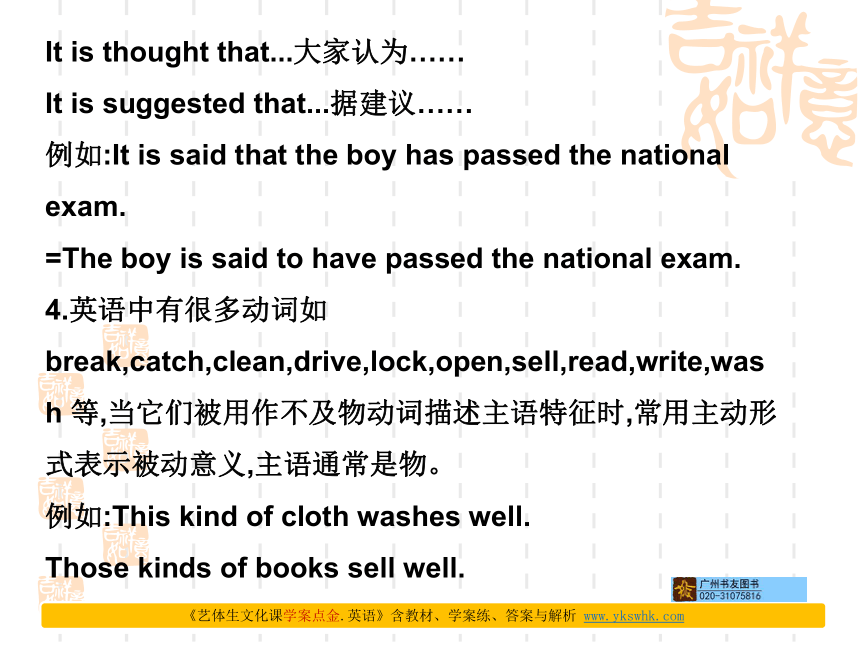
文档简介
高三英语总复习基础部分——语法讲解篇
2.2 高中英语常用语法——语态
一、被动语态的构成
被动语态由“助动词be+done”构成。be有人称、数和时态的变化。
1.一般现在时:am/is/are done
Rice is grown in the south of the states.
2.一般过去时:was/were done
The building of a new car factory was agreed on last
month.
3.一般将来时:will(shall) be done
Cars will be sent abroad by sea.
4.过去将来时:would(should) be done
The manager said the project would be completed by the end of the year.
5.现在进行时:am/is/are being done
The rooms are being painted now.
6.过去进行时:was/were being done
Trees were being planted here at this time last year.
7.现在完成时:have/has been done
I have been told that the sports meeting might be put off.
8.过去完成时:had been done
He had been considered to be a great leader.
9.常用时态的主被动形式对照表
时态 主动 被动
一般现在时 do/does am/is/are done
一般过去时 did was/were done
一般将来时 will do will be done
二、被动语态的用法
1.不知道或不必说出动作的执行者。
How is this word pronounced?
After war,everything was destroyed.
过去将来时 would do would be done
现在进行时 am/is/are doing am/is/are being done
过去进行时 was/were doing was/were being done
将来进行时 will be doing
现在完成时 have/has done have/has been done
过去完成时 had done had been done
2.强调动作的承受者。
If you break the school rules,you will be punished.
A new Hope School will be opened in our village.
Xiao Li was elected monitor of the class.
3.动作的执行者不是人而是无生命的事物。
The bridge was washed away by the flood.
We were shocked by the news of his death.
Many accidents were caused by careless driving.
4.有些动词习惯上常用被动语态。
He was born in this city.
The school is situated in the suburbs.
三、被动语态的应注意事项
1.带情态动词的被动结构形式:情态动词+be+done
The baby should be taken good care of by the baby-sitter.
2.在使役动词have,make,let以及感官动词see,watch,notice,hear,feel,observe等后面不定式作宾语补足语时,在主动结构中不定式to要省略,但变为被动结构时,要加to。
例:Someone saw a stranger walk into the building.
可改为:A stranger was seen to walk into the building.
3.常用被动语态的句型:
一些表示“据说”或“相信”的动词如believe,consider,expect,report,say,suppose,think等可以用于句型“It+be+过去分词+that从句”或“主语+be+过去分词+to do sth.”。
It is said that...据说……
It is reported that...据报道……
It is believed that...大家相信……
It is hoped that...大家希望……
It is well known that...众所周知……
It is thought that...大家认为……
It is suggested that...据建议……
例如:It is said that the boy has passed the national exam.
=The boy is said to have passed the national exam.
4.英语中有很多动词如break,catch,clean,drive,lock,open,sell,read,write,wash 等,当它们被用作不及物动词描述主语特征时,常用主动形式表示被动意义,主语通常是物。
例如:This kind of cloth washes well.
Those kinds of books sell well.
注意:主动语态表被动强调的是主语的特征,而被动语态则强调外界作用造成的影响。
试比较:The door won’t lock.(指门本身有毛病)
The door won’t be locked.(指不会有人来锁门,指“门没有锁”是人的原因)
5.表示“发生、进行”的不及物动词和短语happen,last,take place,break out,burst out,come out,come about,come true,run out,give out,turn out等要以主动形式表示被动意义。
How do the newspapers come out?
6.系动词没有被动形式,有些表示感受、感官的连系动词如feel,sound,taste,look,feel等在主系表结构中常以主动形式表示被动意义,后面常接形容词。
Your reason sounds reasonable.
7.在need,want,require等词的后面,用动名词主动形式表示被动意义,其含义相当于动词不定式的被动形式。
The house needs repairing(to be repaired).
8.be worth后面跟动名词的主动形式表示被动含义,但不能跟动词不定式;而worthy后面跟动词不定式的被动形式。
The picture-book is well worth reading.
=The picture-book is very worthy to be read.
9.在某些“形容词+不定式”作表语的结构中,句子的主语又是动词不定式的逻辑宾语时,这时常用不定式的主动形式表示被动意义。这些形容词有nice,easy,fit,hard,difficult,important,impossible,pleasant,interesting等。
This problem is difficult to work out.(可看作to work out省略了for me)
10.在too...to...结构中,不定式前面可加逻辑主语,所以应用主动形式表示被动意义。
This book is too expensive (for me) to buy.
11.在be to blame等仍用不定式的主动形式表示被动意义。
Who is to blame for starting the fire?
语态专项练习
一、单项选择题
( )1. a new library in our school last year?
A.Is;built B.Was;built
C.Does;build D.Did build
( )2.An accident on this road last week.
A.has been happened B.was happened
C.is happened D.happened
B
D
( )3.Cotton in the southeast of China.
A.is grown B.are grown
C.grows D.grow
( )4.Up to now,the moon by man already.
A.is visited B.will be visited
C.has been visited D.was visited
( )5.A talk on Chinese history in the school hall next week.
A.is given B.has been given
C.will be given D.gives
A
C
C
( )6.How many trees this year?
A.are planted B.will plant
C.have been planted D.planted
( )7.A lot of measures to save the little girl so far.
A.are taking B.are being taken
C.have been taken D.will be taken
( )8.—When this kind of computers ?
—Last year.
A.did;use B.was;used
C.is;used D.are;used
C
C
B
( )9.The Great Wall all over the world.
A.knows B.knew
C.is known D.was known
( )10.Who this book ?
A.did;written B.was;written by
C.did;written by D.was;written
( )11.A story by Granny yesterday.
A.was told us B.was told to us
C.is told us D.told us
C
B
B
( )12.The monkey was seen off the tree.
A.jump B.jumps
C.jumped D.to jump
( )13.The school bag behind the chair.
A.puts B.can be put
C.can be putted D.can put
( )14.Older people well.?
A.looks after B.must be looked after
C.must look after D.looked after
D
B
B
( )15.Our teacher carefully.?
A.should be listened to B.should be listen
C.be listened D.is listened
( )16.Great changes place.Many new schools .
A.have taken;have been opened B.take;are open
C.are taken;open D.have been taken;are opened
( )17.A lot of tall buildings in his hometown in the last three years.
A.have set up B.have been set up
C.were set up D.set up
A
A
B
( )18.They printing 500 copies by the end of last month.
A.had finished B.have finished
C.had been finished D.have been finished
( )19.He some pieces of advice,but he to them.
A.gave;didn’t listen B.was given;wasn’t listened
C.give;wasn’t listened D.was given;didn’t listen
( )20.He by the teachers.
A.is always praised B.praises
C.have been praised D.always is praised
A
D
A
二、用括号内所给动词的正确形式填空。
1.It’s said that the long bridge (build) in two months.
2.Where to have the meeting (discuss) now.
3.Which language the most widely (speak) in the world?
4.The lost boy (not find) so far.
5.Last year a large number of trees (cut) down.
6.The students often (tell) to take care of their desks and chairs.
will be built
is being discussed
is
spoken
hasn’t been found
were cut
are
told
7.The old man is seriously ill.He (must send) to the hospital.
8.Vegetables, eggs and fruits (sell) in this shop.
9.—What knives (make) of ?
—They (make) of metal and wood.
10.Can the magazine (take) out of the library?
11.Our classroom (clean) every day.
12.The stars can’t (see) in the daytime.
13.The flowers (water) by Li Ming already.
must be sent
are sold
are
made
are made
be taken
is cleaned
be seen
have been watered
14.This kind of shoes (sell) well.
15.How long your uncle (be) in Shenzhen?
16.The dish (smell) delicious.
17.Look! Someone (dance) in the next room.
18.Tea (grow) in South China.
19.I (give) a birthday present by my parents every year.
20.A large number of engineers (send) to Africa by our government to help the people there every year.
sells
has
been
smells
is dancing
is grown
am given
are sent
21.The sick boy (take) to hospital by the police yesterday.
22.Waste paper shouldn’t (throw) everywhere.It’s our duty to keep our city clean.
23.—Do you have any problems if you (offer) this job?
—Well,I’m thinking about the working day.
24.It is reported that more new teaching buildings
___________ (build) in our school in the next term.
25.The new library building (complete) last week.
was taken
be thrown
are offered
will be built
was completed
26.—David, turn off the TV if no one is watching it.
—But it (turn) off already!The music is from the radio.
27.Nick (offer) a job in a bank,but to our surprise,he didn’t take it.
28.—Do you often plant trees in spring?
—Yes,many trees (plant) in our school every year.
29.It’s difficult for the village children to cross the river for school.I think a bridge should (build) over the river.
30.I (tell) to get there before seven tomorrow,so I’ll have to get up early.
has been turned
was offered
are planted
be built
was told
三、用被动语态翻译下列句子。
1.据说学校要来一位新英语老师。
?
2.窗户是我儿子打破的。
?
3.我们告诉他们教室很快就会被打扫的。
?
4.昨天这个时候电视机正在被修理吗?
?
5.我们学校不教俄语。
It is said that the school will have a new English teacher.
The window is broken by my son.
We told them the classroom would be cleaned soon.
Was the TV being mending at this time yesterday?
Russian is not taught in our school.
2.2 高中英语常用语法——语态
一、被动语态的构成
被动语态由“助动词be+done”构成。be有人称、数和时态的变化。
1.一般现在时:am/is/are done
Rice is grown in the south of the states.
2.一般过去时:was/were done
The building of a new car factory was agreed on last
month.
3.一般将来时:will(shall) be done
Cars will be sent abroad by sea.
4.过去将来时:would(should) be done
The manager said the project would be completed by the end of the year.
5.现在进行时:am/is/are being done
The rooms are being painted now.
6.过去进行时:was/were being done
Trees were being planted here at this time last year.
7.现在完成时:have/has been done
I have been told that the sports meeting might be put off.
8.过去完成时:had been done
He had been considered to be a great leader.
9.常用时态的主被动形式对照表
时态 主动 被动
一般现在时 do/does am/is/are done
一般过去时 did was/were done
一般将来时 will do will be done
二、被动语态的用法
1.不知道或不必说出动作的执行者。
How is this word pronounced?
After war,everything was destroyed.
过去将来时 would do would be done
现在进行时 am/is/are doing am/is/are being done
过去进行时 was/were doing was/were being done
将来进行时 will be doing
现在完成时 have/has done have/has been done
过去完成时 had done had been done
2.强调动作的承受者。
If you break the school rules,you will be punished.
A new Hope School will be opened in our village.
Xiao Li was elected monitor of the class.
3.动作的执行者不是人而是无生命的事物。
The bridge was washed away by the flood.
We were shocked by the news of his death.
Many accidents were caused by careless driving.
4.有些动词习惯上常用被动语态。
He was born in this city.
The school is situated in the suburbs.
三、被动语态的应注意事项
1.带情态动词的被动结构形式:情态动词+be+done
The baby should be taken good care of by the baby-sitter.
2.在使役动词have,make,let以及感官动词see,watch,notice,hear,feel,observe等后面不定式作宾语补足语时,在主动结构中不定式to要省略,但变为被动结构时,要加to。
例:Someone saw a stranger walk into the building.
可改为:A stranger was seen to walk into the building.
3.常用被动语态的句型:
一些表示“据说”或“相信”的动词如believe,consider,expect,report,say,suppose,think等可以用于句型“It+be+过去分词+that从句”或“主语+be+过去分词+to do sth.”。
It is said that...据说……
It is reported that...据报道……
It is believed that...大家相信……
It is hoped that...大家希望……
It is well known that...众所周知……
It is thought that...大家认为……
It is suggested that...据建议……
例如:It is said that the boy has passed the national exam.
=The boy is said to have passed the national exam.
4.英语中有很多动词如break,catch,clean,drive,lock,open,sell,read,write,wash 等,当它们被用作不及物动词描述主语特征时,常用主动形式表示被动意义,主语通常是物。
例如:This kind of cloth washes well.
Those kinds of books sell well.
注意:主动语态表被动强调的是主语的特征,而被动语态则强调外界作用造成的影响。
试比较:The door won’t lock.(指门本身有毛病)
The door won’t be locked.(指不会有人来锁门,指“门没有锁”是人的原因)
5.表示“发生、进行”的不及物动词和短语happen,last,take place,break out,burst out,come out,come about,come true,run out,give out,turn out等要以主动形式表示被动意义。
How do the newspapers come out?
6.系动词没有被动形式,有些表示感受、感官的连系动词如feel,sound,taste,look,feel等在主系表结构中常以主动形式表示被动意义,后面常接形容词。
Your reason sounds reasonable.
7.在need,want,require等词的后面,用动名词主动形式表示被动意义,其含义相当于动词不定式的被动形式。
The house needs repairing(to be repaired).
8.be worth后面跟动名词的主动形式表示被动含义,但不能跟动词不定式;而worthy后面跟动词不定式的被动形式。
The picture-book is well worth reading.
=The picture-book is very worthy to be read.
9.在某些“形容词+不定式”作表语的结构中,句子的主语又是动词不定式的逻辑宾语时,这时常用不定式的主动形式表示被动意义。这些形容词有nice,easy,fit,hard,difficult,important,impossible,pleasant,interesting等。
This problem is difficult to work out.(可看作to work out省略了for me)
10.在too...to...结构中,不定式前面可加逻辑主语,所以应用主动形式表示被动意义。
This book is too expensive (for me) to buy.
11.在be to blame等仍用不定式的主动形式表示被动意义。
Who is to blame for starting the fire?
语态专项练习
一、单项选择题
( )1. a new library in our school last year?
A.Is;built B.Was;built
C.Does;build D.Did build
( )2.An accident on this road last week.
A.has been happened B.was happened
C.is happened D.happened
B
D
( )3.Cotton in the southeast of China.
A.is grown B.are grown
C.grows D.grow
( )4.Up to now,the moon by man already.
A.is visited B.will be visited
C.has been visited D.was visited
( )5.A talk on Chinese history in the school hall next week.
A.is given B.has been given
C.will be given D.gives
A
C
C
( )6.How many trees this year?
A.are planted B.will plant
C.have been planted D.planted
( )7.A lot of measures to save the little girl so far.
A.are taking B.are being taken
C.have been taken D.will be taken
( )8.—When this kind of computers ?
—Last year.
A.did;use B.was;used
C.is;used D.are;used
C
C
B
( )9.The Great Wall all over the world.
A.knows B.knew
C.is known D.was known
( )10.Who this book ?
A.did;written B.was;written by
C.did;written by D.was;written
( )11.A story by Granny yesterday.
A.was told us B.was told to us
C.is told us D.told us
C
B
B
( )12.The monkey was seen off the tree.
A.jump B.jumps
C.jumped D.to jump
( )13.The school bag behind the chair.
A.puts B.can be put
C.can be putted D.can put
( )14.Older people well.?
A.looks after B.must be looked after
C.must look after D.looked after
D
B
B
( )15.Our teacher carefully.?
A.should be listened to B.should be listen
C.be listened D.is listened
( )16.Great changes place.Many new schools .
A.have taken;have been opened B.take;are open
C.are taken;open D.have been taken;are opened
( )17.A lot of tall buildings in his hometown in the last three years.
A.have set up B.have been set up
C.were set up D.set up
A
A
B
( )18.They printing 500 copies by the end of last month.
A.had finished B.have finished
C.had been finished D.have been finished
( )19.He some pieces of advice,but he to them.
A.gave;didn’t listen B.was given;wasn’t listened
C.give;wasn’t listened D.was given;didn’t listen
( )20.He by the teachers.
A.is always praised B.praises
C.have been praised D.always is praised
A
D
A
二、用括号内所给动词的正确形式填空。
1.It’s said that the long bridge (build) in two months.
2.Where to have the meeting (discuss) now.
3.Which language the most widely (speak) in the world?
4.The lost boy (not find) so far.
5.Last year a large number of trees (cut) down.
6.The students often (tell) to take care of their desks and chairs.
will be built
is being discussed
is
spoken
hasn’t been found
were cut
are
told
7.The old man is seriously ill.He (must send) to the hospital.
8.Vegetables, eggs and fruits (sell) in this shop.
9.—What knives (make) of ?
—They (make) of metal and wood.
10.Can the magazine (take) out of the library?
11.Our classroom (clean) every day.
12.The stars can’t (see) in the daytime.
13.The flowers (water) by Li Ming already.
must be sent
are sold
are
made
are made
be taken
is cleaned
be seen
have been watered
14.This kind of shoes (sell) well.
15.How long your uncle (be) in Shenzhen?
16.The dish (smell) delicious.
17.Look! Someone (dance) in the next room.
18.Tea (grow) in South China.
19.I (give) a birthday present by my parents every year.
20.A large number of engineers (send) to Africa by our government to help the people there every year.
sells
has
been
smells
is dancing
is grown
am given
are sent
21.The sick boy (take) to hospital by the police yesterday.
22.Waste paper shouldn’t (throw) everywhere.It’s our duty to keep our city clean.
23.—Do you have any problems if you (offer) this job?
—Well,I’m thinking about the working day.
24.It is reported that more new teaching buildings
___________ (build) in our school in the next term.
25.The new library building (complete) last week.
was taken
be thrown
are offered
will be built
was completed
26.—David, turn off the TV if no one is watching it.
—But it (turn) off already!The music is from the radio.
27.Nick (offer) a job in a bank,but to our surprise,he didn’t take it.
28.—Do you often plant trees in spring?
—Yes,many trees (plant) in our school every year.
29.It’s difficult for the village children to cross the river for school.I think a bridge should (build) over the river.
30.I (tell) to get there before seven tomorrow,so I’ll have to get up early.
has been turned
was offered
are planted
be built
was told
三、用被动语态翻译下列句子。
1.据说学校要来一位新英语老师。
?
2.窗户是我儿子打破的。
?
3.我们告诉他们教室很快就会被打扫的。
?
4.昨天这个时候电视机正在被修理吗?
?
5.我们学校不教俄语。
It is said that the school will have a new English teacher.
The window is broken by my son.
We told them the classroom would be cleaned soon.
Was the TV being mending at this time yesterday?
Russian is not taught in our school.
